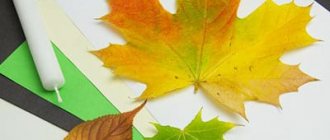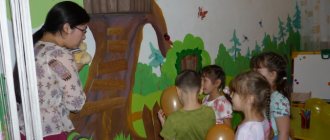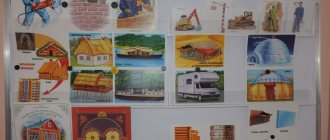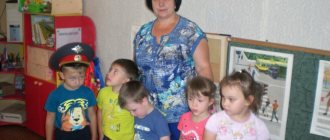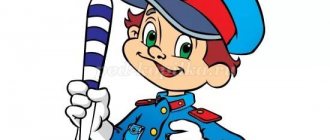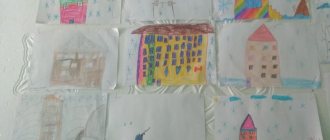Summary of GCD in the middle group of preschool educational institutions for experimenting with sand
Abstract of educational activities in the middle group of preschool educational institutions in the educational field “Cognitive development” on the topic “Sand Country - Wonderland”
Goal : Development of cognitive activity in the process of experimental activities with sand. Program objectives: Educational:
- to form a child’s cognitive interest and cognitive actions in various types of activities through experimentation in conditions of health preservation and life safety;
— introduce children to the properties of sand: flowability, ability to move, ability of wet sand to take any shape; — expand children’s knowledge about the purpose of sand in our lives; — learn to work in a team and independently during experiments; Developmental:
- to develop the cognitive activity of children in the process of becoming familiar with the properties of sand;
- develop all cognitive functions (perception, attention, memory, thinking, speech); — activate and enrich children’s vocabulary, develop coherent speech; — develop fine motor skills through the development of tactile sensitivity as the basis of “manual intelligence”; Educational:
- cultivate curiosity;
— cultivate accuracy when working with sand, compliance with safety regulations; — to cultivate the moral and spiritual qualities of the child during his communication with nature. Preliminary work. Games and experiments with sand. Comparison of sand and clay. Conversations about the purpose and use of sand, a reminder “Precautions when playing with sand,” reading poems and asking riddles about sand and the inhabitants of the desert. Subject-spatial environment - layout “Inhabitants of the Desert” - exhibition of illustrations “Sand and its properties”; - algorithm; - mini laboratory for experimenting with sand; — laptop, projector — equipment and materials for children’s productive activities. Materials and equipment: • For the teacher: game character - the wise Turtle, musical accompaniment, presentation “Man and Sand”, cartoon “Lion Cub and Turtle” • For children: pool with dry sand, box with dry sand and toys - inhabitants of the desert, sand table, sand, cocktail tubes, wet wipes, trays, glue, glue brushes, brush stands, spoons, magnifying glasses (according to the number of children), Easter cake molds, Easter cake trays, sand bags. Types of children's activities: play, communication, cognitive-research, motor, self-service, socialization, productive. Modern educational technologies used: - gaming; - problematic; — ICT; — research; — personality-oriented; - health-saving. Expected results - shows curiosity and interest in cognitive and research activities;
— actively interacts with peers and adults in the process of research and experimentation; - can use new words and expressions in speech: magnifying glass, experiments, grains of sand, loose. Progress of the GCD:
1. Motivational (introductory part). Educator. Guys, we have guests today. Let's welcome them. Educator: Guys! Do you like watching cartoons? Let's now watch an excerpt from a cartoon we know. (Showing an excerpt from the film “The Lion Cub and the Turtle” 2. Setting up a problem-game situation. Educator: Did you like the cartoon? What do you think the mood of the cartoon characters was? Why were they cheerful and joyful? What kind of sand is this? Let’s find out , as much as possible about him. 3. Surprise moment Educator: And the Wise Turtle from this cartoon came to us. She invites us to her native, amazing, full of wonders Sand Country. The Turtle will help us figure out what sand is and why it is needed , what are its properties. Do you want to go on a trip? 4. Rules for handling sand. Educator : Guys, any country has its own rules, and the Sand Country also has its own rules. All guests of the Sand Country should know them and be sure to follow them. Let's think , what rules might there be in Sand Country? (children’s answers are accompanied by mnemonic tables “Rules for handling sand”) - The sand doesn’t like being put in the mouth. - The sand doesn’t like being thrown at other children. - The sand doesn’t like when destroying what other children have built. — Sand doesn’t like it when sand is thrown out of the sandbox. “But sand loves it when children have clean hands, noses and heads. Therefore, guys, after playing with sand, we should wash our hands or wipe them with a damp cloth. — Can we comply with the rules of the Sand Country? Educator: Now we are ready to go to the Sand Country. So! We will go to a sandy land - a wonderland! And the Wise Turtle will show us the way. Let's follow her along a magical path with obstacles (walking between bags of sand) - We will follow the path and come to a sandy land. 5. Playing with sand “Welcome to the sand” We approached the pool with sand. Educator: Here we are. Let's say hello to the sand with our palms. I will introduce you to some ways of greeting. Educator: 1) Touch the sand with your palms, first with the inside, then with the outside, let’s give the sand a piece of our warmth. What does sand feel like? (dry, warm) 2) Take sand into your hands and rub it between your palms. What do you feel? Are you pleased? I feel the warmth of the sand, the small grains. Hands rejoice in the sand! 3) In a sandy country there may be an unusual sand rain. It is very nice. You can make this rain yourself. Watch it happen. (The teacher pours sand from his fist into his palm, then the children repeat.) 4) Now let’s leave traces with the help of our fingers, as “the inhabitants of this country come, camels, lizards” - the fingers walk waddling. 5) “Snakes crawl” - fingers make the surface of the sand wavy. Educator: Well, so we played with the sand. Did you enjoy playing with sand? Educator: Guys, did we follow all the rules in Sand Country? What did we forget to do? (wipe your hands with a damp napkin) Educator: Look at your hands, they are dusty with sand, let's wipe them with a damp napkin. 6. Viewing the presentation “Man and Sand” Educator: Guys, today, “our hero” is sand. To learn more about it, the Wise Turtle invites us to the TV room to look at a magic screen that will show why sand is needed and where it is used. (Presentation “Man and Sand”) 7. Game with sand “Find the animal in the sand” Educator: Guys, do you think animals need sand? D: Yes. Educator: Correct. Animals hide in the sand from the heat. And now we will find the inhabitants of the Sandy Country who hid in the sand and create a model of the Sandy Country. 8. Dynamic pause Educator: Let's imagine that you and I are grains of sand. “Turn around yourself and turn into grains of sand. Squatted down. How much sand we have! But then the wind blew, picked up the grains of sand and they flew in different directions (a waltz sounds and the children imitate flight) The wind died down and the grains of sand flew in and fell to the ground. The wind suddenly blew again and blew away the grains of sand. The breeze stopped blowing, the rain started dripping and all the grains of sand from the water stuck together (the children stand in a circle and hug each other by the shoulders.) Turn around yourself and turn into children" 9. Conducting experiments with sand Educator: The wise turtle said that in the sand country there is an interesting club for children “I want to know everything”. Let's go to the club! Here we will explore the properties of sand and conduct experiments. Experiment 1. “What is sand made of?” Educator: Now we will look at sand. Will an unusual object help us with this? Who knows what it's called (magnifying glass). That's right or a magnifying glass. To do this, take a magnifying glass and look through the magnifying glass to see what the sand is made of. What do you see? Children: Grains of sand. Educator: Sand consists of small grains of sand. Experiment 2. “Flowability of sand.” Educator: Take sand from a plate with a spoon and pour it onto a tray. What does sand do? Children: It's falling out. Educator: Does sand flow easily (easy) - Why does it flow easily (dry, free-flowing). -And if it were wet, it would crumble (mould). Experiment 3. “Movement of sand” (breathing exercise) Educator: Guys, do you think sand can move? How can I check this? Take the straws and gently blow into the sand. What's happening? Children: The sand is moving. (The experiments are accompanied by a picture depicting the properties of sand) 10. Finger play Our good little hands can do everything, even though we are tiny. They can draw, sculpt and make patterns, glue, cut, play, clap, even dance! Let's squeeze them tightly now, let's start doing good deeds! 11. Drawing on the sand “Let’s revive the Sand Country” Educator: Guys, you can also draw on the sand. Let's go to the magic table and bring the sandy land to life. We will draw the sun, rainbow, trees and flowers. 12. Productive activities of children by subgroups. Educator: We learned a lot about sand, and now the Wise Turtle invites us to the Creative Workshop. We will prepare gifts for the residents of Sand Country as a souvenir: we will bake Easter cakes and create sand drawings. Take your seats at the tables. What is in store for you here? (Wet sand, Easter cake molds, trays, napkins) - for 1 subgroup (Brushes, glue, colored cardboard, dry sand, stands for brushes, napkins) - for 2 subgroups. 13. Reflection. Educator: Guys, look at what wonderful gifts we made with our own hands for the residents of Sand Country! Did you like our trip to Sand Country? Thanks to the Wise Turtle for inviting us to such an amazing country. Guys, it's time for us to go back to kindergarten. And, of course, we have to say goodbye to sand! Repeat after me: “Thank you, our dear sand, you helped us become smarter. Goodbye sand! Goodbye, residents of the Sand Country!
We recommend watching:
Summary of GCD in the middle group “Visiting the Traffic Light” Summary of GCD in the middle group on the theme “New Year” Direct educational activities on experimentation in the middle group Summary of GCD in the middle group on the topic “Air” (with elements of entertainment)
Similar articles:
Summary of continuous direct educational activities in the middle group
Summary of GCD in the senior group on the topic “So that your teeth don’t hurt”
Summary of GCD in the middle group on the topic “Journey to the autumn forest”
Summary of GCD in the middle group on the topic: “So summer is over”
Sand Day in kindergarten, games during the walk “In the Land of Sand”
Children go outside and meet on the playground.
Host: Hello guys. Do you happen to know why we have gathered today? Children's answers
Host: It’s strange, but today there is no holiday. Or maybe one of you has a birthday? Children's answers
Presenter: no again...
the presenter notices a letter on the Christmas tree.
Well, well, well, what is this envelope?
Let's get a look. The presenter opens the envelope, and there is sand.
Presenter: strange letter, there is nothing there except...sand. And I realized, we need to see who it’s from. The presenter approaches a child who can read and asks who it is from to read it. A child reads “The Queen of Sand.” As soon as the child reads, the music immediately turns on and the Queen of Sand enters
Queen of Sand: hello guys!
I sent you a hint so that you would guess that today I am visiting your kindergarten. It looks beautiful here: there are houses, flowers and even sandboxes. Do you like to play with sand? Children's answers
Queen of Sand: great. But in my country everything is built from sand. Do you want to visit my country? Children's answers
Queen of Sand: If you're ready, then it's time for us to go.
Our journey will not be ordinary. You will go there on your own, together with your teachers. There are islands waiting for you with tasks that you must complete. If you do everything, I promise you a surprise upon your return. And the tests will begin right now. You need to solve riddles. Ready? Children's answers
Queen of Sand: Well done guys, you passed the first test. And they got tips to get to the place. Good luck!
